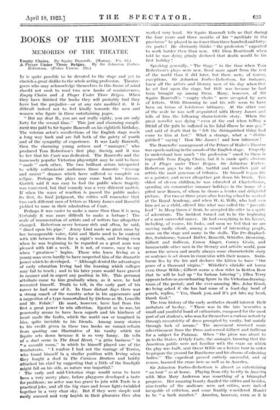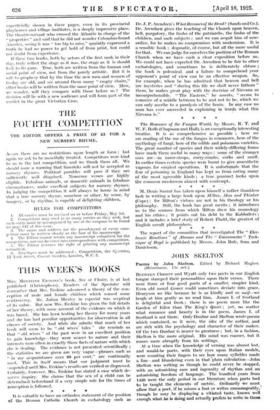BOOKS OF THE MOMENT
MEMORIESOF THE -THEATRE tmpty Chairs. By Squire Bancroft. (Murray. 1(s. Gd.) 4....,Player Under Three Reigns. By Sir Johnston ForbesRobertson. (Fisher Unwin. 21s.) IT is quite possible to be devoted to the stage and yet to cherish a great dislike to the whole acting profession. Theatregoers who may acknowledge themselves in this frame of mind should not omit to read two new books of reminiscences, Empty Chairs and A Player Under Three Reigns. When they have finished the books they will probably find they have lost the prejudice—or at any rate modified it. It is difficult indeed not to feel kindly towards the men and women who figuic in these entertaining pages.
" But my deaf B., you are not really eighty, you arc only ; forty for the second time." This just and charming compliment was paid to Sir Squire Bancroft on his eightieth birthday. , The veteran actor's recollections of the English stage reach a long way back and are full both of the gaiety of youth and of the sympathy of experience. It was Lady Bancroft, !then the charming young actress and "manager," who produced Tom Robertson's first play, Society, and it was to her that his Caste was dedicated. The Bancrofts and the 'immensely popular Victorian playwright may be said to have ." made " each other. The two brilliant actors interpreted to wildly enthusiastic audiences those domestic tea-cup and saucer" dramas which have suffered so complete an eclipse. Perhaps the plays may come back into favour. , Garrick said it was easy to fool the public where tragedy was concerned,: but that comedy was a very different matter. If when the wave of reaction is passed the public makes its first, its final judgment, the critics will remember that two such different men of letters as Henry James and Rossetti yielded to none in their admiration of Caste.
Perhaps it was easier to make a name then than it is now, (Certainly it was more difficult to make a fortune ! The scale of remuneration of artists and of writers has altogether changed. Robertson -never became rich and often, he said, "dined upon his pipe." Jenny Lind made no great sums by her incomparable voice, Grisi and Mario used to be content with £30 between them for a night's work, and Irving even when he was beginning to be regarded as a great man was ,pleased with £40 a week. It is not, of course, easy to say when " greatness " begins. Those who knew Irving as a young man seem hardly to have suspected him of the dramatic power which he developed. "Although denied the advantages of early education Irving had the learning which colleges may fail to teach ; and in his later years would have graced in manner and in aspect any position in life. This personal attribute came to him gradually when, as it were, lie had recreated himself. Truth to tell, in the early part of his career he had none of it. In those distant days there was a strong smack of the country actor in his appearance and a suggestion of a type-immortalized by Dickens as Mr. Lenville and Mr. Polak." He must, however, have had from the first a great power to win affection. Egotist as he was, his generosity seems to have been superb and his kindness of heart made the faults, which the worldsaw or imagined in him, quite invisible to his friends. Among many stories to his credit given in these two books we cannot refrain from quoting one illustrative of his vanity which Sir Squire sets down because it is so very funny. He tells of a duel scene in The Dead Heart, "a grim business" in a moonlit room," in which he himself played one of the eombatants. "I confess I had not the courage of Terriss, who found himself in s. similar position with Irving when they fought a duel in The Corsican Brothers and boldly 'attacked his chief by suggesting that a little of the limelight might fall on his side, as nature was impartial."
I The early and mid-Victorian stage would seem to have been a very merry place, before playgoers developed a taste for problems ; no actor was too grave to join with Toole in a practical joke, and all the big stars and lesser lights twinkled together in a very clear sky. But if they were simple and easily amused and very boyish in their pleasures they also worked very hard. Sir Squire Bancroft tells us that during the four years and three months of his "novitiate in the provinces" he played in no fewer than three hundred and fortysix parts ! He obviously thinks "the profession" expected to work harder then than now. Old Dion Boucicault when told he was dying grimly declared that death would be his first holiday !
Speaking generally, "The Stage" in the time when Tom Robertson's plays were new, lived more apart from the rest of the world than it did later, but there were, of course, exceptions. Sir Johnston Forbes-Robertson, for instance, knew all the artists and literary men of his day when first he set foot upon the stage, but Unit was because he had been brought up among them. Many, however, of Sir Squire Bancroft's "empty chairs" were occupied by men of letters. With Browning lie and his wife seem to have been on terms of boisterous intimacy. At the other end of the scale he was well acquainted with Henry James and tells of him the following characteristic story. When the great novelist was dying "even at the end when telling a frieial of the pain he suffered in his fatal illness he was gay," and said of death that he " felt the distinguished thing had come to him at last." What a strange, what a distinguished" saying ! How like James ! and how inhuman !
The Bancrofts" management of the Prince of Wales's Theatre was epoch-making in the annals of the English stage. Properly to understand how much "the profession" owed to them is impossible from Empty Chairs, but it is made quite obvious in A Player under Three Reigns. Sir . Johnston ForbesRobertson pays to the able, tactful and unselfish pair of artists the most generous of tributes. He himself began life as a painter, and never altogether put down his brush. The eldest of eleven children, he was educated at Charterhouse, spending six consecutive summer holidays in the house of a priest near Rouen, of whom he draws a tender and delightful picture. For two or three years after leaving school he worked at the Royal Academy, and when W. G. Wills, who had seen him act as a child, offered him what was called the "juvenile lead " in Mary Queen o' Seats, lie accepted the offer in a spirit of adventure. The incident turned out to be the beginning of a most successful career. Ile had everything in his favour, including, of course, his looks, and soon we feel that we are moving easily about, among a crowd of interesting people, some on the stage and many in the stalls. The Pre-Raphaelites, Swinburne, Samuel Butler, Rossetti, Whistler, Browning, Gilbert and Sullivan, Canon Ainger, Corney Grain, and innumerable other men in the literary and artistic world, pass across the screen and nearly always some characteristic story or sentence is set down in connexion with their names. Swinburne lies by the fire and declares the kitten to have "the grace of a thousand virgins." Whistler's vitriolic wit burns even Oscar Wilde ; Gilbert warns a slow rider in Rotten Row that he will be had up "for furious loitering" ; Ellen Terry appears before us an enchanting figure in the Victorian drawing room of the period ; and the ever-amusing Mrs. John Wood, On being asked if she has had some of a feast-day bowl of punch, replies, "Yes, thank you, and it's got into my head, thank God."
The true history of the early aesthetes should interest their imitators of to-day. "There was in the late 'seventies a small and youthful band of enthusiasts, composed for the most part of art students, who won for themselves a curious notoriety through eccentricity of dress prompted by vanity, but mainly through lack of means." The movement received some advertisement from the Press and served Gilbert and Sullivan for a subject for Patience. When " the piece was about to go to the States, D'Oyly Carte, the manager, knowing that the American public were not familiar with the craze on which the play was built, sent Oscar Wilde on a lecture tour in order to prepare the ground for Bunthorne and his chorus of admiring ladies." The expedient proved entirely successful, and of course, boomed the craze here as well as in America.
Sir Johnston Forbes-Robertson is almost as entertaining "on tour" as at home. Playing from city to city in America with Miss Mary Anderson was something of a triumphal progress. Her amazing beauty dazzled the critics and besides, nine-tenths of the audience were not critics, were indeed incapable of criticism, and some frankly considered Hamlet to be "a back number." America, however, even as it is
superficially shown in these pages, even in its provincial playhouses and village institutes, is a deeply impressive place. The theatre-servant who crossed the Atlantic in charge of the properties" and said that he did not wonder Columbus found America, seeing it was "too big to miss," quaintly expressed a truth he had no power to get hold of from print, but could not. doubt from experience.
If these two books, both by actors of the first rank in their day, truly reflect the stage as it Was, the stage as it is should look to its guns. True, both are written from the human and social point of view, not from the purely artistic. But it is safe to prophesy that by the time the new men and women of to-day arc old, and see around them many "empty chairs," other books will be written from the same point of view. How, we wonder, will they compare with those before us ? The decision will lie with a new audience and will form part of the verdict in the great Victorian Case.











































 Previous page
Previous page